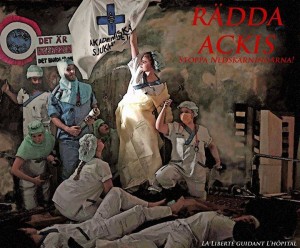
Participants: Allt åt Alla (Sweden), Precàrios Inflexìveis (Portugal), Nuit Debout (France), Attac (France), Interventionistische Linke (Germany), Project Shelter (Germany), Clap (Italy), Workers’ Initiative (Poland), Precarious (di∫)Connections (Italy), Plan C/Junior Doctors (England), Citoyen Europe (France), Solidaires (France), Netzwerk der Sozialen Arbeit (Germany)
Starting from a discussion and an evaluation of different experiences of struggle and organization (junior doctors’ strike in England, the strike of elderly care workers in Sweden, the initiatives of nurses in Poland and of the workers of cooperatives which provide social services in Italy, the strike of kindergarten workers in Germany, the attempts to involve migrant women employed as domestic workers in the strike of migrant labor in Italy), the workshop provided a picture of a general European process of precarization of welfare that has two faces. On the one hand, cuts, financialization and outsourcing are making the condition of workers in social services more and more precarious, also increasing the unpaid labor of women and the number of waged domestic care workers, mainly migrant women. On the other hand, far from producing a relative equalization of social conditions as it was in past times, welfare is becoming an instrument both for creating hierarchies among workers according to their wages, gender and legal status, and for governing the mobility of internal and external migrants in Europe. In this frame, it becomes urgent to understand how to organize effective initiatives on a transnational scale, going beyond fragmentation, facing the precarious conditions of both care workers and patients/users, and breaking the isolation of domestic workers, but also how to connect those initiatives by assuming welfare, care and social reproduction as crucial fields of struggle against a general European process of precarization.
The experiences that have been discussed during the workshop pointed out some crucial challenges. While the junior doctors’ strike would not have been possible and effective if the nurses had gone on strike too, the prolonged kindergarten workers’ strike in Germany failed because of the impossibility of involving other workers (such as those employed in the enterprises that provide food services to kindergartens), so that the strike was most of all a burden both for workers and for families. In France, the reformation of the health-care system proceeded together with the approval of the loi travail, but the industrial actions of the workers of the health-care system remained isolated. The first point is then to go beyond the ‘single-profession’ initiatives or disputes and to create connections that overcome the sectors’ divisions and categories. At the same time, it must be recognized that this kind of labor is specific, insofar as its interruption would affect not only those who make profits but also those who benefit of health and care services. Junior doctors, for instance, organized the strike in a way that guaranteed basic and emergency services, thanks to nurses extra-labor, so as to maintain a social support for their struggle. It was therefore underlined that it is important to create real connections between the workers and the patients/users. Another crucial point concerned the specific organization of labor. In Sweden, for instance, health and care services at the municipal level are undergoing a process of outsourcing. The need to offer a competitive service implies that the movements of care workers are checked through GPS and Apps that impose an intensification of their performances and isolate them. These controlling devices, that should be virtually used by municipalities in order to check the subcontractors’ performances, turn into a mechanism to control care workers themselves, like in Amazon warehouses. The system of outsourcing make it particularly difficult to ascertain the chain of command and accountability and to identify ‘an enemy’, while intensification and isolation are a clear obstacle to organization. These limits must be overcome through the identification of a common program that could be the starting point for an extended process of communication and organization among workers, on a European scale. This program is necessary both to involve workers who are not already unionized, and to make pressure upon trade unions and force them to support strikes and autonomous initiatives of the workers.
The TSS platform has been recognized as the place where this program should be discussed. Even though welfare systems are managed on a national level, it is clear that they are affected by the same transnational process of transformation and precarization and that the struggles against this process must be connected in order to be visible and effective. To define a common program and common claims means therefore both to recognize and to overcome the differences among local or national conditions of labor, assuming that the double precarity of welfare and care work is connected with the general attack on wages, with the national and European government of mobility and with the transnational sexual division of labor. The TSS platform is the place where to produce a common knowledge and build a common language – also by using the website as a collector of experiences and discussions – in order to connect, resonate and politicize the different struggles in Europe, assuming welfare as an impact point where to hit capital, to break its accumulation and to fight against the political conditions of exploitation on a transnational scale.
Read the workshop’s presentation: https://www.transnational-strike.info/2016/10/18/workshop-n-2-welfare-care-work-and-social-reproduction/





